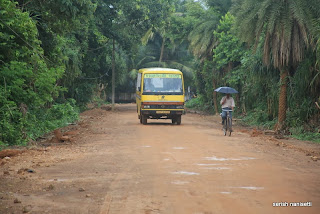This is my mother. Today is her birthday. If she was alive, she would have been 79. I am
here because of her. Every time I see this haunting photograph clicked at a cousin's wedding
in Visakhapatnam, I think about how I would have clicked her photograph now. Sitting on the big green chair at our Nagpur home, or the sofa for which she designed white covers with her embroidery of elephants, deer and peacocks? Or in the kitchen where she used to cook the awesome yet simple dishes?
With the cake she used to bake for my birthday and hide it in the attic out of my reach? Or in the sprawling house of her father which is now a hotel? The mind races with ideas and photo op images.
We lived in Nagpur, Motibaug Colony, Q No 173/4. I don't remember much about her appearance except for the fact that when I see myself in the mirror, I see my mother's complexion. I remember the white conch bangle, the red bangles she would wear along with the gold bangles and big red dot of sindoor. Born into prosperity and pelf in Gopalpur on Sea in Orissa, marriage brought her to first Nainpur and then Nagpur where my father was posted. Summer vacations would mean the 1000 km trip of two days switching three trains and endless hours in waiting rooms where I would get to sleep on the bedding roll (do you guys remember) which had the smell of vintage leather thanks to the straps.
A woman can be herself or be a mother. My mother was both. By being a mother to three children didn't affect her personality. Or did it? Everytime I see a black and white movie with her favourite song in Telugu and Hindi I wish she was alive today. In the age before TV, the Philips valve radio was our window to the world. We listened to news, songs, stories and then some. Afternoons meant listening to radio Cuddapah Kendram which was the source of Telugu songs and culture at home.
Amma surrounded us with culture. We had an aquarium before it was a rage, my brother had a Hawaiian guitar at a time when mothers would hit their children for not studying, my brother did oil paintings when paints were priced at a premium. Then in the late seventies my brother bought a HMV 1010 ic record player and my world opened to the sounds of ABBA, Bee Gees, Tavares, Osibisa, Beethoven, Manna De, Jagjit and Chitra Singh. Today, as I see helicopter moms trying to control their children's creativity, I wonder about my mother and thank her every living moment for letting me be me: Even when I hid class books to avoid reading. When I was in class VII, my brother bought Stevenson's Treaure Island home which he wanted to gift it to a friend the next day. I had my science exam the next day and I desperately wanted to read the book. My brother wanted none of it. My mother struck a deal for me. If I could answer the questions my brother asked, I would be free to read Treasure Island. My mother knew me well and I won. And I was allowed to read the book till 11 p.m. I was swept away by the sea spray of Stevenson and his characters and it was the beginning of my adventure with words and stories.
Children learn the ways of the world from their fathers and about relationships from their mothers. For me my mother showed both the paths. Her world and ideas were very clear. Her feminine intuition cut through the claptrap of politics. For her Gandhi was the villain of partition for singing religious songs in public sphere and Jinnah a real hero who failed.
"Religion belongs inside the home you don't have to show it to the world," she said. "When Nehru died in 1964 his ashes were sprinkled all over the country and it led to 10 years of drought," she told me and also told me about the heroic Lal Bahadur Shastri who swam across a river to educate himself and as a prime minister came up with the idea of skipping dinner on Tuesday evening to save foodgrains when Pakistan attacked India. Patriotism didn't mean salaming Gandhi or Nehru or calling them ji but in standing up when the National Anthem was being played, whereever we were.
One of her sisters had a troubled marriage at a time when such things didn't exist in respectable families. As a child, I learnt that was unacceptable. How can a man control or ill-treat a woman? Not done. The men folk who peered into other people's houses were deemed bad and those who didn't poke their noses were considered good. I wasn't told what was good or bad, but was given the positive choice.
I was a mamma's boy as I followed her everywhere. I would listen to her conversations with others and keep filing away the information. My brother would have none of it and pull me out of the feminine company. But I had learnt a lot. I became a metrosexual man before the word was coined.
Was it all good? No.
I grew up to be a man unfit for this age of greed, envy and competitive jealousy. A non assertive person who doesn't know when to say no.
But I am happy. I just miss my mother, her sambar, her kaja, her avakai, her mean mutton curry, her dry fish baingan curry, her ugadi pachchadi (I know one other mother who makes it similarly).
This blog post is for my mother who believed in me, my brother and my sister. This is for us. Happy Birthday Amma.

























